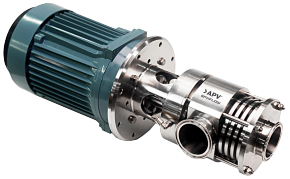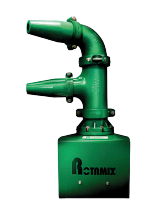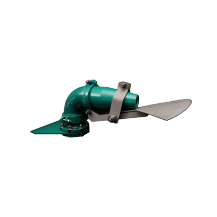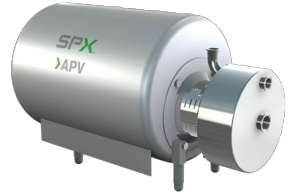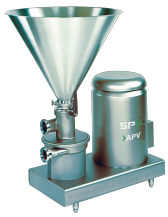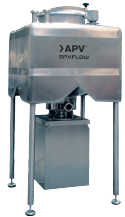Mixers and agitators' technology is a complex process technology used for homogenizing a mass. The principle behind this technology is based on the scientific field of fluid dynamics. The goal of this process technology is to characterize and optimize the flow in a way that achieves a connection between two substances up to a specified level of homogeneity. The optimal design of this technology is crucial for the efficiency of the system. Faster process workflows, better raw material utilization, simplified maintenance, and higher product quality are achieved in industrial process applications.



Mixers and Agitators
HOW DO MIXERS and agitators WORK?
 Mixers and agitators operate based on the principles of fluid dynamics. Two pure substances are set in motion and combined into a mixture due to the induced flows. Simplified, the process consists of two main components: the stirring element and a drive. The process usually takes place in a closed container, ensuring hermetic separation between the environment and the process. Liquids, gases, or solid substances can be combined through mixers down to the molecular level. However, if the mixture is not processed immediately, coagulation can occur.
Mixers and agitators operate based on the principles of fluid dynamics. Two pure substances are set in motion and combined into a mixture due to the induced flows. Simplified, the process consists of two main components: the stirring element and a drive. The process usually takes place in a closed container, ensuring hermetic separation between the environment and the process. Liquids, gases, or solid substances can be combined through mixers down to the molecular level. However, if the mixture is not processed immediately, coagulation can occur.
TYPES OF MIXERS AND AGITATORS
Fundamentally, process technology can be divided into two areas. The mixing process can be achieved through an electronically driven agitator or by using a static mixer. The appropriate process technology is selected based on the nature or design of the system, the solids contained, and other influencing factors.
Agitator Mixing Technology
Electronically driven mixers typically consist of a motor, a gearbox, and a rotor. The process design and the selection of individual components are based on different criteria, such as the viscosity of the medium. Motorized agitators can be easily and flexibly adapted to new process conditions. Mixtures that are not processed promptly can remain in a homogeneous state using motorized stirring technology. Additionally, it is possible to dissolve solid deposits efficiently and quickly near the bottom.
Dynamic Mixers
Like agitators, dynamic mixers are electronically driven by a motor. Dynamic mixers can be flexibly adjusted to changing processes. The mixer's speed is variable, always ensuring a consistently high level of homogenization. The mixing technology also enables rapid mixing results with low power consumption and minimal product loss.
Static Mixers
Unlike agitators, static mixers do not require a drive and therefore do not consume energy. Static mixers consist of differently arranged elements, each influencing the flow pattern and thus the degree of homogeneity. The continuous pressure in a process application forces the pure substances through the static mixer. Turbulences occur at the edges or elements of the mixer, eventually creating a homogeneous mixture.
APPLICATIONS OF MIXERS AND AGITATORS
Mixing technologies are utilized in various production processes.
Agitators ensure the qualitative preservation of an entire batch. Constant stirring, for instance, successfully prevents the crystallization of sugary foods.
Settled solids in beverage additives can be processed back into a homogeneous product with the use of agitators.
Static mixers are employed in the food manufacturing process due to their characteristics. During the production of cocoa mass, the product undergoes various temperature phases. This can lead to laminar flows negatively affecting homogenization. The flow pattern generated by static mixers significantly minimizes this phenomenon.
Static mixers can also be used for homogenization in chemical processes. Through this mixing technology, various parameters such as dilution or pH adjustment can be optimized during the ongoing process.
AXFLOW - YOUR CONTACT FOR MIXING TECHNOLOGY
Maximum efficiency for your process application. We are happy to advise you for the optimal integration of mixing technology! Contact the AxFlow sales engineer in your region now.
6 series from 2 manufacturers
-
- Adhesives
- Bakery and confectionery
- Beauty & Personal Care
- Brewing and beverages
- Chemical
- Confectionery
- Convenience food
- Dairy
- Detergents
- Distilleries
- Drinking Water
- Fish Farming
- Food & Beverage
- Meat Processing
- Oil Fats & Mayonnaise
- Paint & Surface Coating
- Petrochemical
- Pharmaceutical
- Plastic
- Research & Development
- Surface Finishing
- Textile
-
- Circulation
- Control
- Conveying
- Cooling
- Descaling
- Desinfection
- Discharge
- Distribution
- Dosing
- Extraction
- Feed
- Filling
- Filtration
- Flow Control
- Heating
- High-Pressure
- High-Temperature
- High-Volume
- Injection
- Low-Pressure
- Medium-Pressure
- Metering
- Mixing
- Process
- Processing
- Recirculation
- Recovery
- Refueling
- Rinsing
- Transfer
- Treatment
- Volumetric Dispensing
-
- Adjustable-Flow
- Automatic
- CIP
- Compact
- Containment
- Corrosion-Proof
- Direct-Drive
- Electric
- Explosion-Proof
- Flange
- Heavy-Duty
- High Temperature
- High-Efficiency
- High-Flow
- High-Performance
- Horizontal Mount
- In-Line
- Intrinsically Safe
- Low Shear
- Mechanical
- Mechanical Seal
- Mixed Flow
- Mobile
- Modular
- Multi-Stage
- Oil-Free
- Pulse-less
- Rotary
- Rugged
- Sanitary
- Self-priming
- SIP
- Variable Speed
- Vertical
- Vertical-Mount

